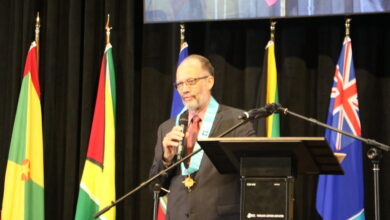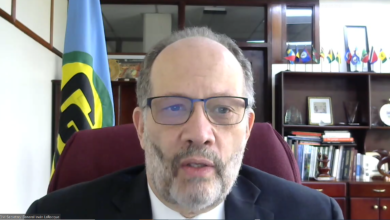It is quite fitting that such a discussion about the future of the African Caribbean Pacific Group of States (ACP) should take place in the Caribbean, for it is in this Region that the idea was conceived and it was this Region that played a pivotal role in the formation of this grouping. It is also fortunate that among the participants over the next two days are some who were present at the 1972 informal discussion in Georgetown, Guyana among Foreign Ministers of Africa and the Caribbean which eventually led to the ACP. I refer to Sir Shridath Ramphal and Sir Edwin Carrington.
The Preamble to the original Georgetown Agreement establishing the ACP in 1975, recognised the need to accelerate, consolidate, and strengthen the process of solidarity among developing countries. It expressed a desire to promote greater and closer trade and economic relations, and effective regional and inter-regional cooperation among ACP States.
The Amended Georgetown Agreement of November 1992, introduced the fundamental principles of human dignity, human rights, and rights of peoples. It also introduced emphasis on interdependence, complementarity, and mutual interest as well as self-reliant, endogenous and self-sustained development, based on cultural and social values.
Twenty years later in 2012, the 7th Summit of ACP Heads of States and Government, meeting in Equatorial Guinea, issued the Sipopo Declaration entitled the “Future of the ACP Group in a Changing World: Challenges and Opportunities”. Strength, unity and solidarity, poverty eradication, sustainable development, all appear in the preamble to that Declaration. The Declaration itself promotes regional and inter-regional cooperation in the areas of economic and social development and trade.
Even after close to four decades, the underlying principles have remained similar even if the wording may appear modernised and updated. The question we must now ask is what has changed and how do we react, as an ACP Group, to the profound systemic changes that have been taking place in the international environment .
A number of Global Developments have impacted the ACP Group of States collectively and as individual states:
1. Changing global economic and geopolitical realities have altered the landscape in which the ACP Group of States operates. The earlier emergence of Newly Industrialised Countries (NICs) and the current importance of Brazil, Russia, India, China and South Africa (BRICS) have served to change the global financial and economic balance of power. The importance of the BRICS and the G20 as influential political and economic actors, illustrate that changing economic and geopolitical environment.
2. The establishment of the WTO and increased emphasis on rules based trade in goods and services have also served to change global economic development and relationships. Increasing emphasis on trade liberalisation, within a global context, has become the norm in global trade relations. In fact, developing countries have lost preferences which they previously enjoyed and must give reciprocity in trade to developed country partners. This phenomenon has been so pervasive that in ACP/EU relations for example, reciprocal Economic Partnership Agreements are replacing the trade provisions of Cotonou which is essentially a development agreement. Preferential trade is quickly disappearing from the development agenda.
3. Emerging global challenges and reactions to these challenges constitute another development helping to shape operating conditions for the ACP Group of States and individual ACP States. Climate change, its economic cost, its potential for constraining economic development opportunities, and its impact on the poorer communities is one of these major challenges.
The debt burden of small, vulnerable states is also another major obstacle facing ACP States. That burden negatively impacts on their capacity to effectively plan and finance their own development. Dependence is placed on dwindling grant resources as most of our countries are not in a position to generate sufficient surpluses to finance their own development. Even where soft loans are available heavily indebted middle income countries cannot access these resources because of graduation and differentiation.
Another major challenge is that of Crime and Security. Combating crime and providing for security, demands a heavy capital and recurrent financial burden. The global trade in illicit drugs and firearms not only heightens the challenge of increasing levels of crime, but has social and economic development implications. International terrorism also affects ACP States, particularly as it relates to their stability and the cost of complying with global norms to deal with this particular problem.
I could go on and give a long exposition on the new global landscape in which the ACP must operate. But, I believe that I have made the point. Despite the similarity of objectives specified in the original Georgetown Agreement, and the 2012 Sipopo Declaration, the objective circumstances in which the ACP is operating has changed. The only constant is change, and in order to remain relevant the ACP must adapt to the new global realities.
It is clear, as Prime Minister of Saint Lucia, Dr the Honourable Kenny Anthony told his colleagues at the 7th ACP Summit, that: “At this time of economic distress worldwide, we must look beyond our boundaries for ways in which our unity can make a difference to solutions, and work among ourselves and with other developing countries to bring hope to our people and credit to our Group.”
Mr Chairman, Ladies and Gentlemen, The following questions suggest themselves:
1. Do we need an ACP Group of States?
2. Should a future ACP Group of States deal primarily with the EU?
3. What kind of relationship should the ACP Group of States have with the BRICS and others?
4. Is there a role for an ACP which seeks to collectively exert economic and political influence on the global economy?
5. What thematic priorities should the ACP focus on?
6. Can the ACP find political space in the context of an already existing G77 Group?
7. To what extent does increasing and deepening regionalisation, such as CELAC, have an impact, negative or positive, on the inter-regional co-operation premise which lies at the base of the ACP concept?
Having posed those questions there is no doubt in my mind that there is space for a restructured and vibrant ACP Group of States. Our Group has grown from the original 46 to 79 countries and has to its advantage, decades of inter-regional solidarity on various global issues such as trade, development finance, political dialogue, and relations with other international and regional organisations. These are comparative advantages that it must fully embrace and exploit.
Our vision should entail being a strong and dynamic institution, with no fear of our future. There is no doubt in my mind that the exhortations contained in the original Georgetown Agreement, the Amended Georgetown Agreement, and the Sipopo Declaration, continue to have relevance for the ACP.
This Caribbean Stakeholders’ Consultation with the Eminent Group of Persons is intended to provide insights and answers to these and other questions on the future of the ACP. This consultation is timely. As a Caribbean Group, we must factor in hemispheric and Caribbean regional developments and considerations in the responses which we provide, and the conclusions which we reach on the future of the ACP and a role for CARIFORUM within that grouping. We have the expertise at hand to ensure that over the next two days, ideas and practical suggestions will be forthcoming.
I thank you.




